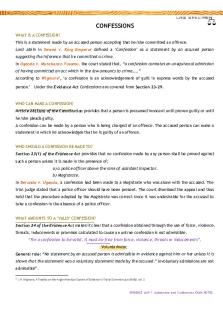Confessions Summary PDF

| Title | Confessions Summary |
|---|---|
| Author | Ern For |
| Course | Introduction to Law |
| Institution | University of Otago |
| Pages | 1 |
| File Size | 56.7 KB |
| File Type | |
| Total Downloads | 9 |
| Total Views | 139 |
Summary
Brief summary of the confessions portion of LAWS101...
Description
Confessions Summary 1) A confession is admissible under s27 of the Evidence Act unless, on the basis of an evidential foundation, the defendant or the judge raises the issue of reliability, oppression, or, impropriety. 2) Reliability (s28 Evidence Act) a) Judge must exclude unless satisfied on balance of probabilities, that the circumstances in which the confession was made were not likely to have adversely effected its reliability b) List of circumstances (non-exhaustive) which are likely to affect reliability i) Physical, mental or psychological state of defendant (whether apparent or not) e.g. R v PK: 16-y-o, tired, confused, exhausted. Pressured to make statement, circumstances were deemed likely to affect reliability ii) Characteristics of the defendant – Mental, intellectual, physical (whether apparent or not) iii) Nature, manner and circumstances in which questions were put iv) Nature of any threat, promise or representation made to defendant or any other person (1) Fatu – Promised reduced sentence for confession, would a normal person confess under these circumstance, court held no (2) R v TWW – (Mr Big, went to Supreme Court) General plausibility of statement is relevant. Defendant was not held to be isolated, immature or otherwise vulnerable, not held to be intimidating. The more the threat of violence faux organisation the greater the concern of liability 3) Oppression (s29 Evidence Act) a) A judge must exclude unless satisfied beyond reasonable doubt that the confession was not influenced by oppression, truth of statement is not relevant b) Oppression is defined under s29(5) as: i) Oppressive, violent, inhuman, or degrading conduct towards or treatment of the defendant, or any other person, or threat of conduct of that kind c) Wilson (COA) i) Over 5 hours of questioning in a small hot room, defendant did not want to answer, constant pressure. Held to be oppressive d) R v Hawea i) Hawea called “Dickhead,” as he was a gang member held not to oppressive 4) Impropriety (s30 Evidence Act) a) A non-oppressive, reliable confession may still be excluded if it was improperly attained...
Similar Free PDFs

Confessions Summary
- 1 Pages

2. Confessions to Crime
- 1 Pages

Admissions AND Confessions
- 7 Pages

Confessions of the fox
- 3 Pages
Popular Institutions
- Tinajero National High School - Annex
- Politeknik Caltex Riau
- Yokohama City University
- SGT University
- University of Al-Qadisiyah
- Divine Word College of Vigan
- Techniek College Rotterdam
- Universidade de Santiago
- Universiti Teknologi MARA Cawangan Johor Kampus Pasir Gudang
- Poltekkes Kemenkes Yogyakarta
- Baguio City National High School
- Colegio san marcos
- preparatoria uno
- Centro de Bachillerato Tecnológico Industrial y de Servicios No. 107
- Dalian Maritime University
- Quang Trung Secondary School
- Colegio Tecnológico en Informática
- Corporación Regional de Educación Superior
- Grupo CEDVA
- Dar Al Uloom University
- Centro de Estudios Preuniversitarios de la Universidad Nacional de Ingeniería
- 上智大学
- Aakash International School, Nuna Majara
- San Felipe Neri Catholic School
- Kang Chiao International School - New Taipei City
- Misamis Occidental National High School
- Institución Educativa Escuela Normal Juan Ladrilleros
- Kolehiyo ng Pantukan
- Batanes State College
- Instituto Continental
- Sekolah Menengah Kejuruan Kesehatan Kaltara (Tarakan)
- Colegio de La Inmaculada Concepcion - Cebu











